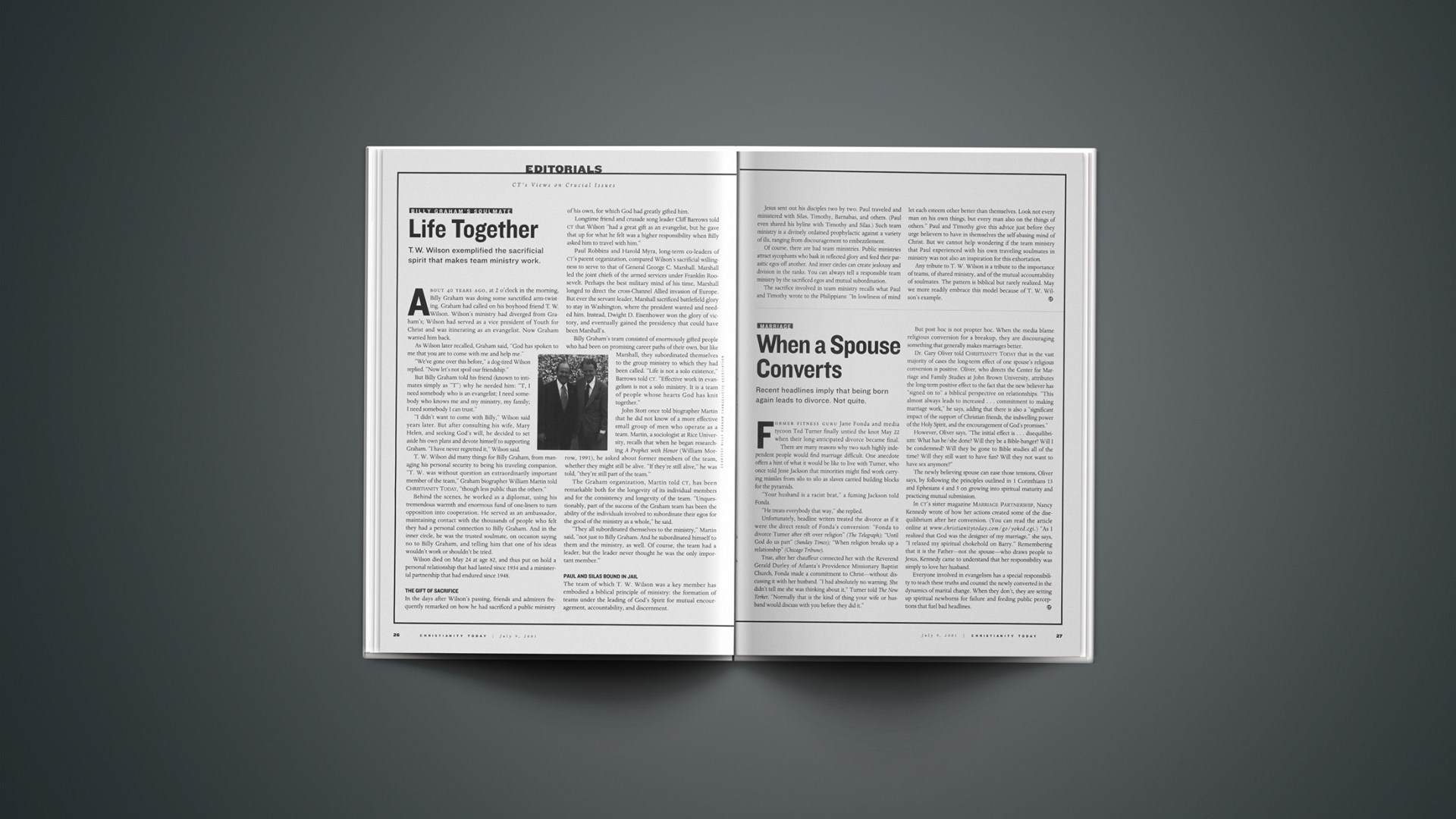Former fitness guru Jane Fonda and media tycoon Ted Turner finally untied the knot May 22 when their long-anticipated divorce became final.
There are many reasons why two such highly independent people would find marriage difficult. One anecdote offers a hint of what it would be like to live with Turner, who once told Jesse Jackson that minorities might find work carrying missiles from silo to silo as slaves carried building blocks for the pyramids.
“Your husband is a racist brat,” a fuming Jackson told Fonda.
“He treats everybody that way,” she replied.
Unfortunately, headline writers treated the divorce as if it were the direct result of Fonda’s conversion: “Fonda to divorce Turner after rift over religion” (The Telegraph); “Until God do us part” (Sunday Times); “When religion breaks up a relationship” (Chicago Tribune).
True, after her chauffeur connected her with the Reverend Gerald Durley of Atlanta’s Providence Missionary Baptist Church, Fonda made a commitment to Christ—without discussing it with her husband. “I had absolutely no warning. She didn’t tell me she was thinking about it,” Turner told The New Yorker. “Normally that is the kind of thing your wife or husband would discuss with you before they did it.”
But post hoc is not propter hoc. When the media blame religious conversion for a breakup, they are discouraging something that generally makes marriages better.
Dr. Gary Oliver told Christianity Today that in the vast majority of cases the long-term effect of one spouse’s religious conversion is positive. Oliver, who directs the Center for Marriage and Family Studies at John Brown University, attributes the long-term positive effect to the fact that the new believer has “signed on to” a biblical perspective on relationships. “This almost always leads to increased. … commitment to making marriage work,” he says, adding that there is also a “significant impact of the support of Christian friends, the indwelling power of the Holy Spirit, and the encouragement of God’s promises.”
However, Oliver says, “The initial effect is. … disequilibrium: What has he/she done? Will they be a Bible-banger? Will I be condemned? Will they be gone to Bible studies all of the time? Will they still want to have fun? Will they not want to have sex anymore?”
The newly believing spouse can ease those tensions, Oliver says, by following the principles outlined in 1 Corinthians 13 and Ephesians 4 and 5 on growing into spiritual maturity and practicing mutual submission.
In CT’s sister magazine Marriage Partnership, Nancy Kennedy wrote of how her actions created some of the disequilibrium after her conversion. (You can read the article online at www.christianitytoday.com/go/yoked.cgi.) “As I realized that God was the designer of my marriage,” she says, “I relaxed my spiritual chokehold on Barry.” Remembering that it is the Father—not the spouse—who draws people to Jesus, Kennedy came to understand that her responsibility was simply to love her husband.
Everyone involved in evangelism has a special responsibility to teach these truths and counsel the newly converted in the dynamics of marital change. When they don’t, they are setting up spiritual newborns for failure and feeding public perceptions that fuel bad headlines.
Copyright © 2001 Christianity Today. Click for reprint information.
Related Elsewhere:
In Christianity Today’s sister publication, Marriage Partnership, Nancy Kennedy analyzed what to do when your loved one doesn’t love God.
Beliefnet asks why no one rejoiced Jane Fonda’s conversion and analyzes whether religion broke up the marriage.
The Chicago Tribune’s article claimed the third wheel in the relationship was Jesus.
The Sunday Times called Fonda “the latest in a flood of religious converts whose newly discovered faith has undermined once-stable relationships“
After separation, Fonda serves divorce papers over “rift over religion,” according to The Telegraph.
BBC News outlined Fonda’s “fun but rather empty life” up to her conversion and divorce.
Turner has made a career of offending Christians—and everyone else.
After the horrible year he had, Turner turned suicidal and “felt like Job,”The Guardian reported.
The results of a 1992 Christianity Today survey gave snapshots of how readers feel on divorce, marriage and sex.










